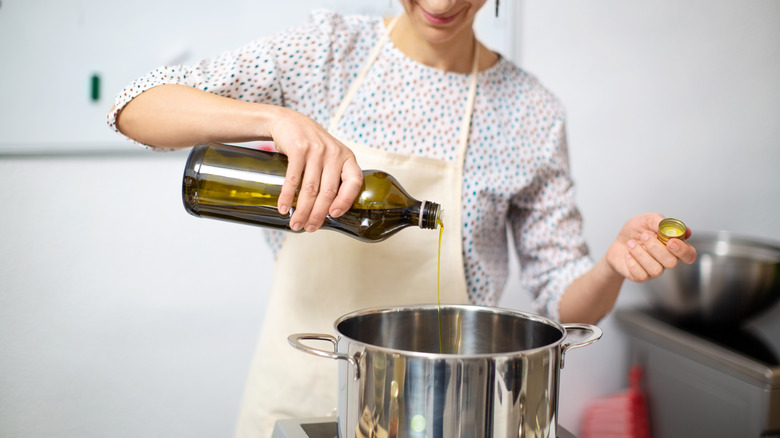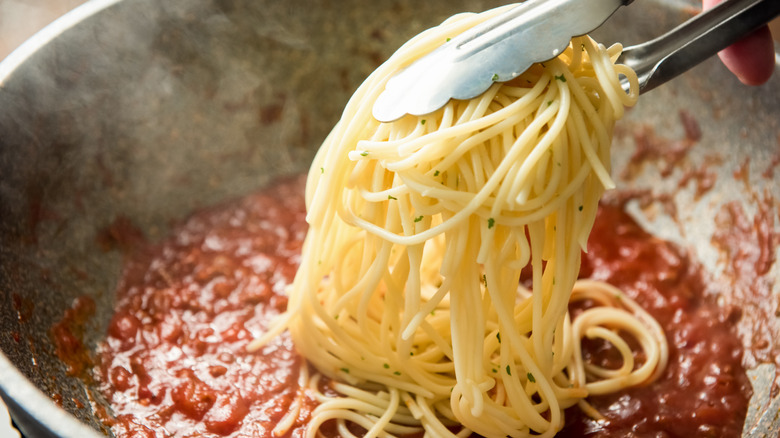Why You Should Stop Adding Oil To Pasta Water ASAP According To Lidia Bastianich
When cooking pasta, take it from one of the greats and "never, never, never put oil in the water." This piece of advice from Lidia Bastianich, Emmy Award-winning chef and host of "Lidia's Kitchen," definitively answers a question that often yields conflicting opinions: Should you add oil to your pasta water to prevent your noodles from sticking together?
Bastianich is squarely on team no oil and for good reason. "Oil will coat your pasta and will inhibit the sauce to grasp on to your cooked pasta," Bastianich tells Wisconsin Public Radio. Nobody wants slippery noodles and a sauce that doesn't adhere, so it's best to skip the oil. The pasta authorities–aka Barilla–concur: "[Oil] will only make the pasta slippery which means your delicious sauce will not stick," the company writes on its website.
Besides, everyone knows oil and water don't mix so any added oil in your boiling pasta water will simply sit on top. Critics of this method also argue that the pasta will absorb some of that excess oil, which will affect the taste and also weigh the pasta down.
The flipside
Despite this, there are advocates — including chef Gordon Ramsay– of adding oil to pasta water who swear it really does prevent individual noodles from sticking together during cooking. This can be particularly useful when cooking long strands of pasta like spaghetti or linguine, which tend to intertwine and stick together during boiling.
Others add a glug of oil to the pot of water for a different reason: to prevent the pot from boiling over. The thinking behind it is that the pasta releases starch into the water which, when brought to a boil, creates thick bubbles that gum together and can eventually cause the pot to boil over. Adding a bit of oil effectively reduces the water's surface tension and keeps the bubbles from sticking together.
No matter which way you lean in the oil debate, one pasta cooking tip is universally agreed on: Salt the pasta water liberally. The correct amount of salt to add is one teaspoon for every four cups of water, adjusting as needed from there.
Other pro pasta cooking tips
If you're concerned about your sauce sticking to the pasta, you'll also want to avoid rinsing the noodles after they're cooked and strained. Rinsing cooked pasta removes the starchy coating that develops on the pasta's surface during cooking. This starch helps the sauce adhere to the pasta, enhancing both the flavor and texture.
Have you ever tried the cold water method for cooking pasta? This approach from chef Alton Brown involves adding pasta to a pot of cold water and bringing both to a boil simultaneously. Besides being a time saver, it leaves you with super starchy pasta water, which is great for building a flavorful sauce.
Finally, you'll want to finish cooking your pasta in its sauce for optimal results. Finishing pasta in sauce allows the pasta to absorb the flavors of the sauce, resulting in a more cohesive and balanced dish. As the pasta cooks in the sauce, it releases some of its starch, which thickens the sauce and helps it cling better to the pasta. This technique also allows the pasta to reach its ideal texture, as it continues to absorb moisture from the sauce without becoming overcooked.


